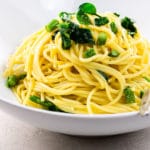Vegetarian Spaghetti Carbonara with Asparagus and Ramps
This wonderfully flavorful vegetarian carbonara recipe uses the traditional Italian sauce technique but substitutes thinly sliced ramps and asparagus for the pork. In that brilliant Italian way, it feels special but only takes 20 minutes to make.
Servings: 4
Calories: 503kcal
Ingredients
- 1 pound (454 grams) asparagus
- 5 ounces (142 grams) ramp leaves OR 2 large leeks
- ½ cup 2 ounces/(57 grams) grated pecorino cheese
- ¼ cup 1 ounce/(28 grams) grated parmesan cheese
- ¼ teaspoon freshly ground black pepper
- 2 tablespoons (30 ml) olive oil
- 2 tablespoons (28 grams) butter
- 2 whole eggs plus 2 egg yolks
- 1 pound (454 grams) spaghetti
Instructions
- Bring a large pot of well-salted water to a boil.
- Meanwhile, remove any woody parts of the asparagus stalks. Thinly slice the stalks, leaving the tips intact.
- Thinly slice the ramp leaves.
- In a large bowl, whisk together the eggs and yolks, pecorino, parmesan, and pepper. Set aside.
- Heat the oil and butter in a 12-inch pan over medium-high heat.
- Add the asparagus and cook, stirring occasionally, until tender, 3 to 5 minutes. Stir in the ramp leaves and cook until just wilted, a minute or two. Remove from the heat and cool slightly.
- Cook the pasta until al dente in the boiling, salted water.
- Toward the end of cooking, scoop out ½ cup of pasta cooking liquid. Slowly pour it into the egg and cheese mixture, whisking constantly.
- When pasta is al dente, use tongs to transfer it to the bowl with the egg mixture. Save the hot cooking water in the pot.
- Toss well to coat pasta with the eggs. You're looking for the mixture to thicken into a nice silky sauce that clings to each strand and isn't watery. This may happen on its own from the residual heat of the pasta, but if it needs a little help, carefully hold or set the bowl over the pot of hot cooking water and continue tossing just until the sauce thickens.
- Gently stir in the cooked ramps and asparagus until well-distributed. Serve immediately.
Notes
- Buying ramp leaves rather than whole ramps with the bulbs still attached is the best way to ensure they've been harvested sustainably. If you've bought or foraged them with the bulbs attached, trim the roots and then slice the whole ramp. Add the sliced bulbs to the pan at the same time as the asparagus to give them a few extra minutes to mellow.
- If using leeks instead of ramps, here's how to prep them. Remove the roots and dark green parts. Halve the white and light green parts lengthwise and then crosswise into thin half-moons. Leeks can retain a lot of grit, so be sure to wash them very well, either after halving or in a salad spinner after slicing.
- Leeks will need to cook for a bit longer than the asparagus, so add them to the pan about five minutes before, rather than after.
- Substituting other seasonal vegetables: If asparagus isn't available, you can pretty much go nuts with the substitutions. A great, super-savory option that mimics some of the qualities of traditional carbonara is to toss in shiitake bacon or sautéed mushrooms. Or use our favorite sautéed spinach or zucchini. In any case, stir the veggies into your carbonara at the end as indicated in the recipe.
- Carbonara needs to be made right before serving. It only takes about 20 minutes, so it's do-able even on many weeknights.
- If you do have leftovers, you can store them in an airtight container in the fridge for a day or two. Reheat on half power in the microwave or in a double-boiler, and expect the texture to be a little different.
- I first published this recipe here way back in 2010. I've updated the post for clarity and tweaked the recipe to todays's standards of perfection, but in essence it remains the same.
Nutrition
Calories: 503kcal | Carbohydrates: 64.2g | Protein: 21.1g | Fat: 18g | Fiber: 4.4g
